Homemade Whole Wheat Sourdough Bread
This post may contain affiliate links. Please read my disclosure policy.
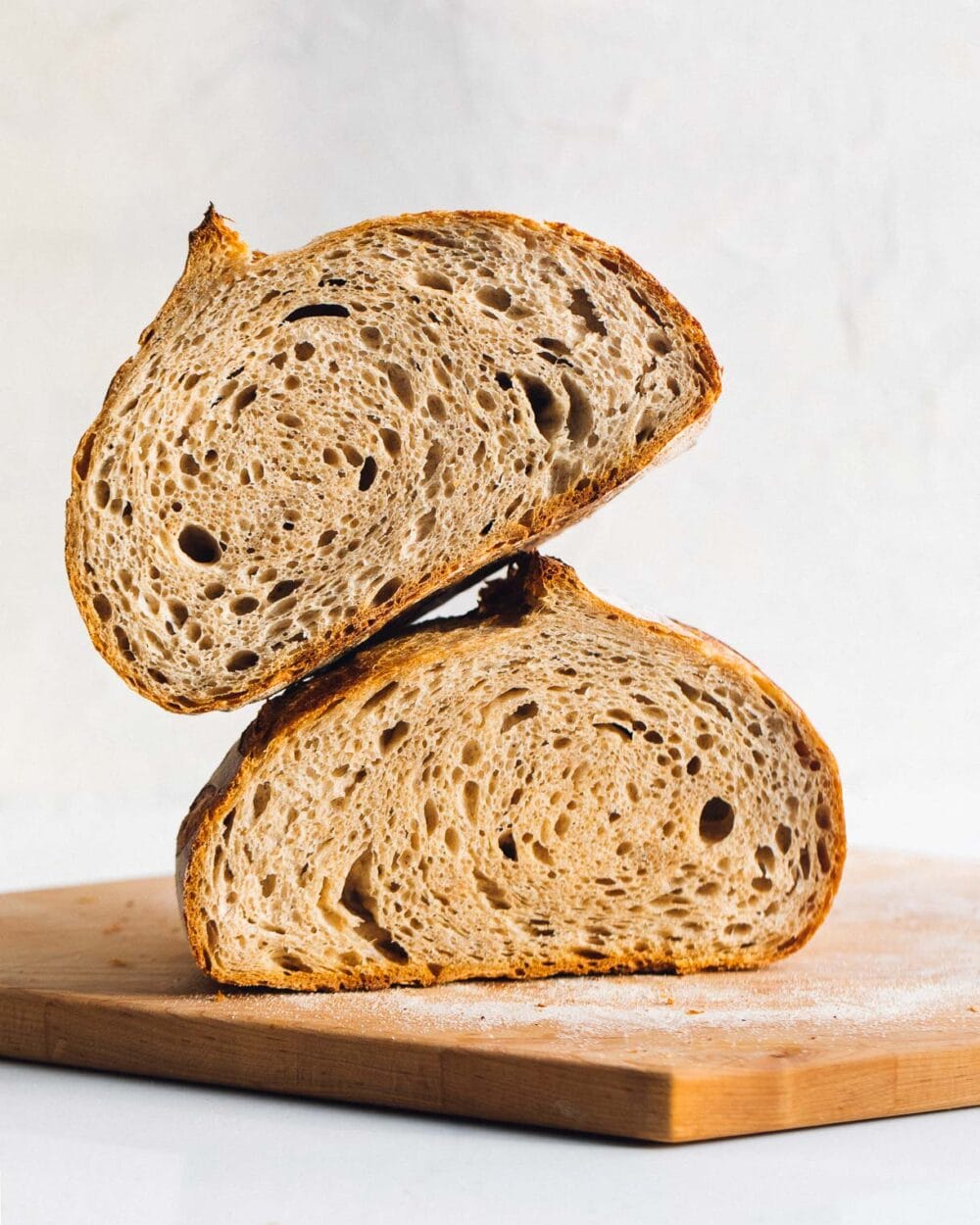
If you want to start your own sourdough journey, you can BUY MY SOURDOUGH STARTER HERE! – and I will ship it you in the mail, with instructions for feeding and maintaining it so you can bake all the amazing bread you dream of. Cost is $12.
I started baking sourdough in 2018. After just one loaf, I knew this process was going to become a hobby and passion of mine. Sourdough is the way bread was made centuries ago, and I’m so glad that many around the world are embracing sourdough again, and sharing their learnings with others. My starter has become a part of me…. It needs to be fed. It asks to be used. The long rise. The satisfying bake. The first slice of whole wheat sourdough bread.
I’ve never been so fascinated in my own kitchen, nurturing a live starter (you can read my Top 5 Sourdough Starter Tips) on my counter and transforming it into the most delicious bread I’ve ever eaten, with just flour and water.
This Whole Wheat Sourdough Bread has:
A golden, crunchy, caramelized crust.
Holes scattered through the soft crumb.
A touch of tang, but mostly yeasty sweet.
You’ll notice that besides whole wheat flour, bread flour and all purpose are also used in this recipe to achieve a tender crumb, and keep the bread from becoming too dense, which can happen if you use all whole wheat.
A beginner friendly recipe.
Bread flour and AP are also important for building structure and allowing for easier handling of the dough, including shaping, due to the higher protein count and strength. Once the dough has been shaped and gone through its final rise, use these tips for scoring your dough.
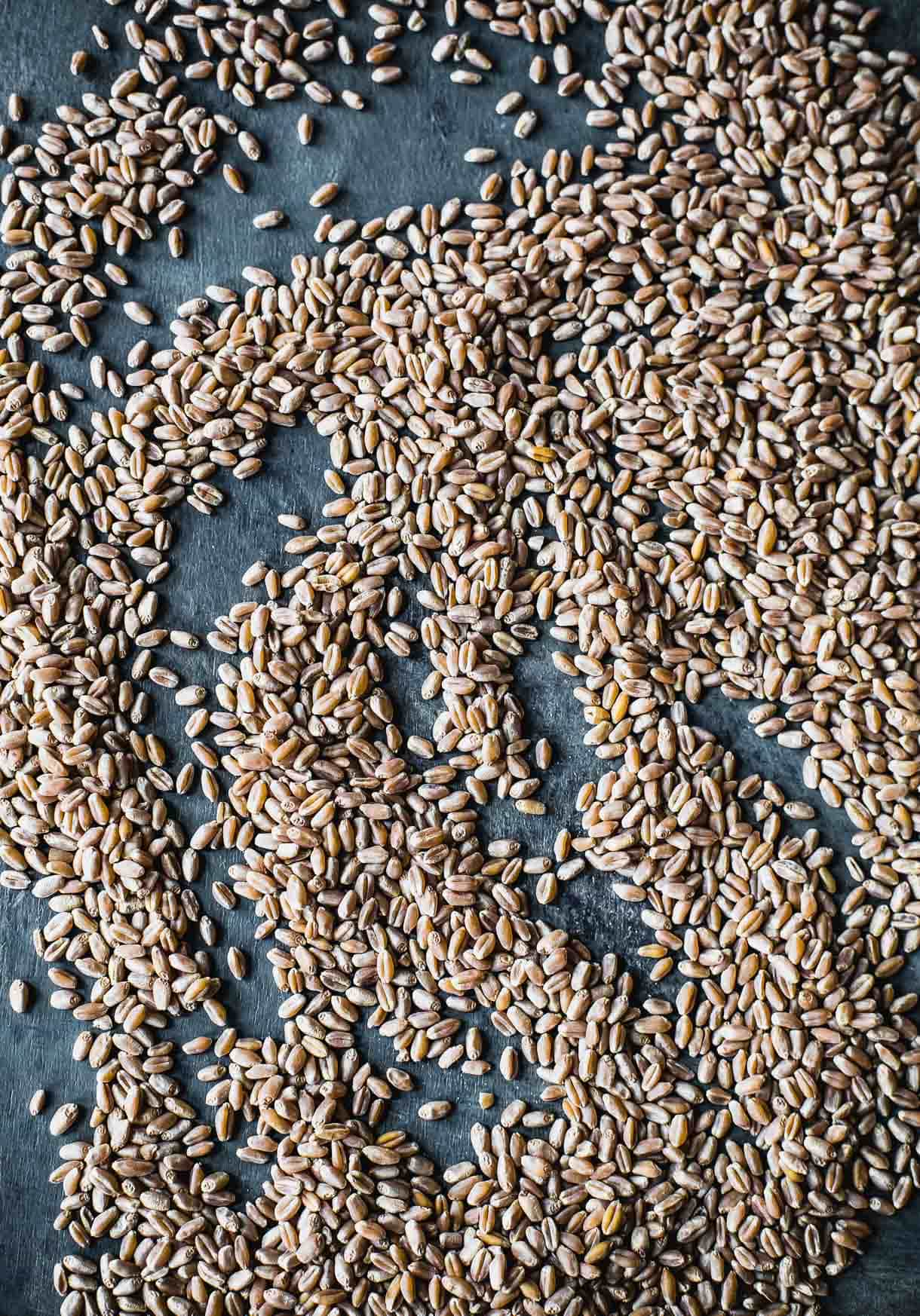
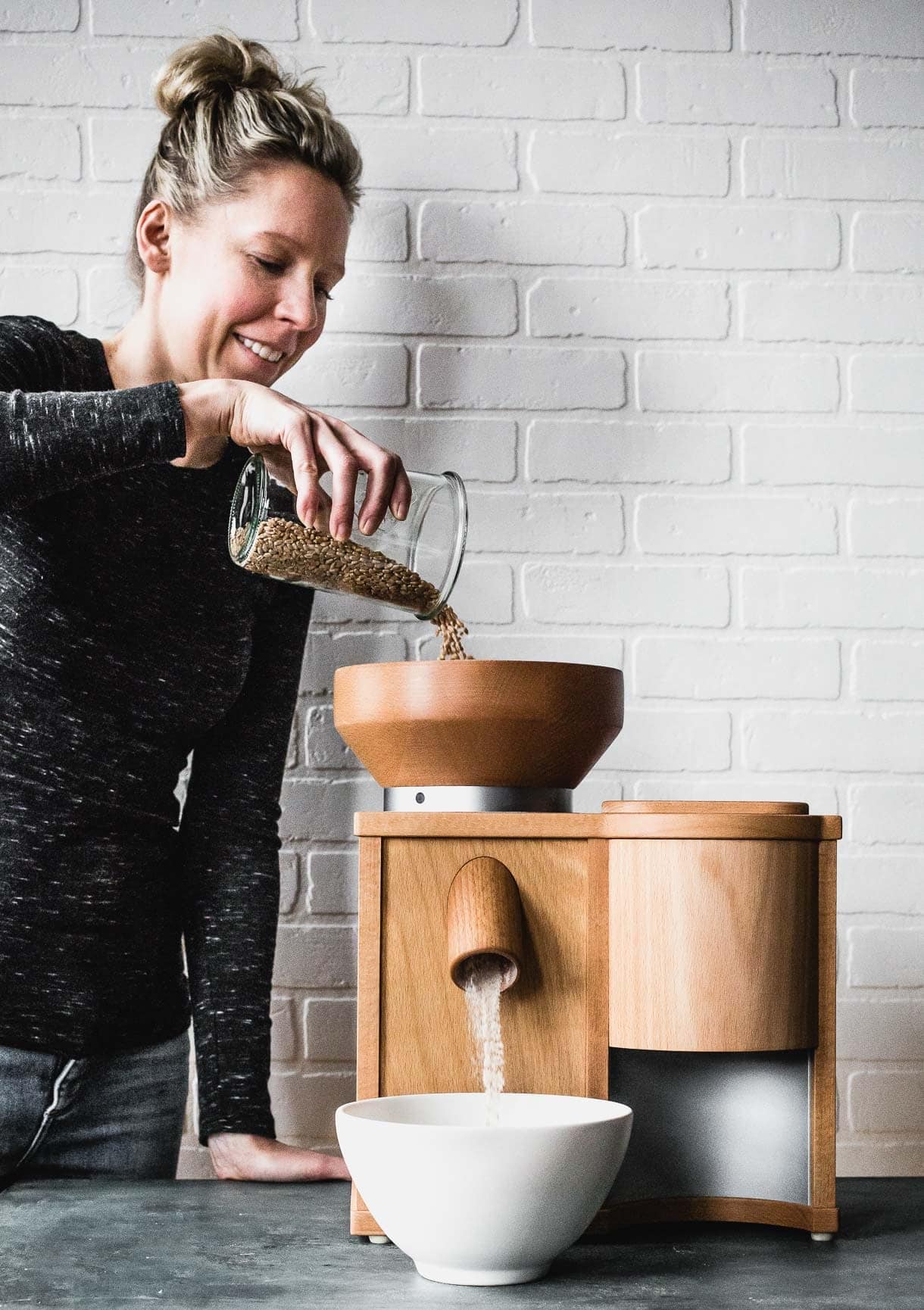
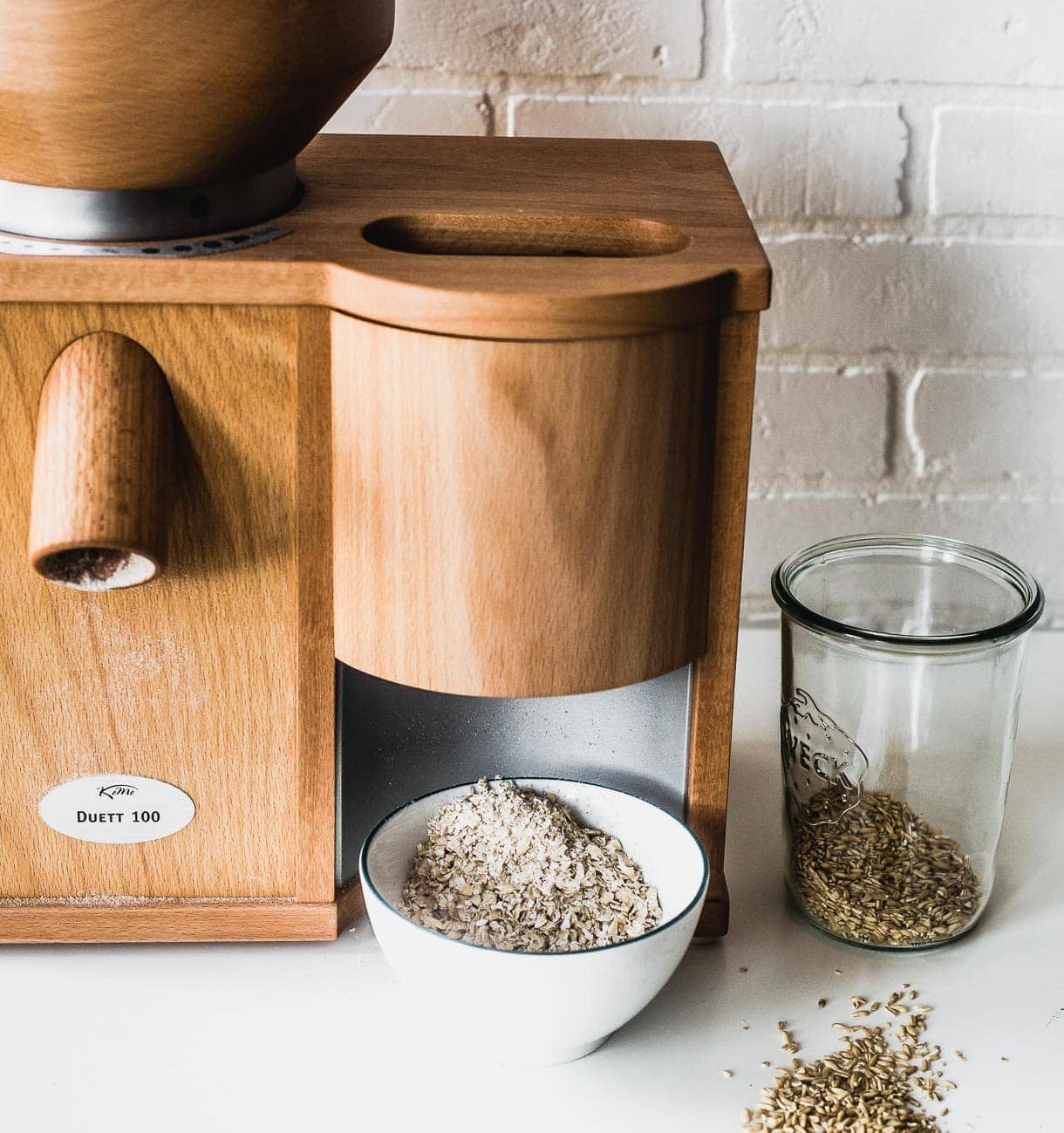
As I continued to learn about sourdough bread, I also started to research using fresh milled grain. I was really curious as to the complexity that whole grains would add to the bread.
I had some experience with home milling, as I acquired the WonderMill grain mill about 6 years ago. I milled only gluten-free grain, and had good end results, but the mill was extremely loud and I didn’t like how the flour flowed into a bucket that had a “hose” coming from the main mill. It got messy. Additionally, it wasn’t the prettiest machine to look at, made of hard plastic.
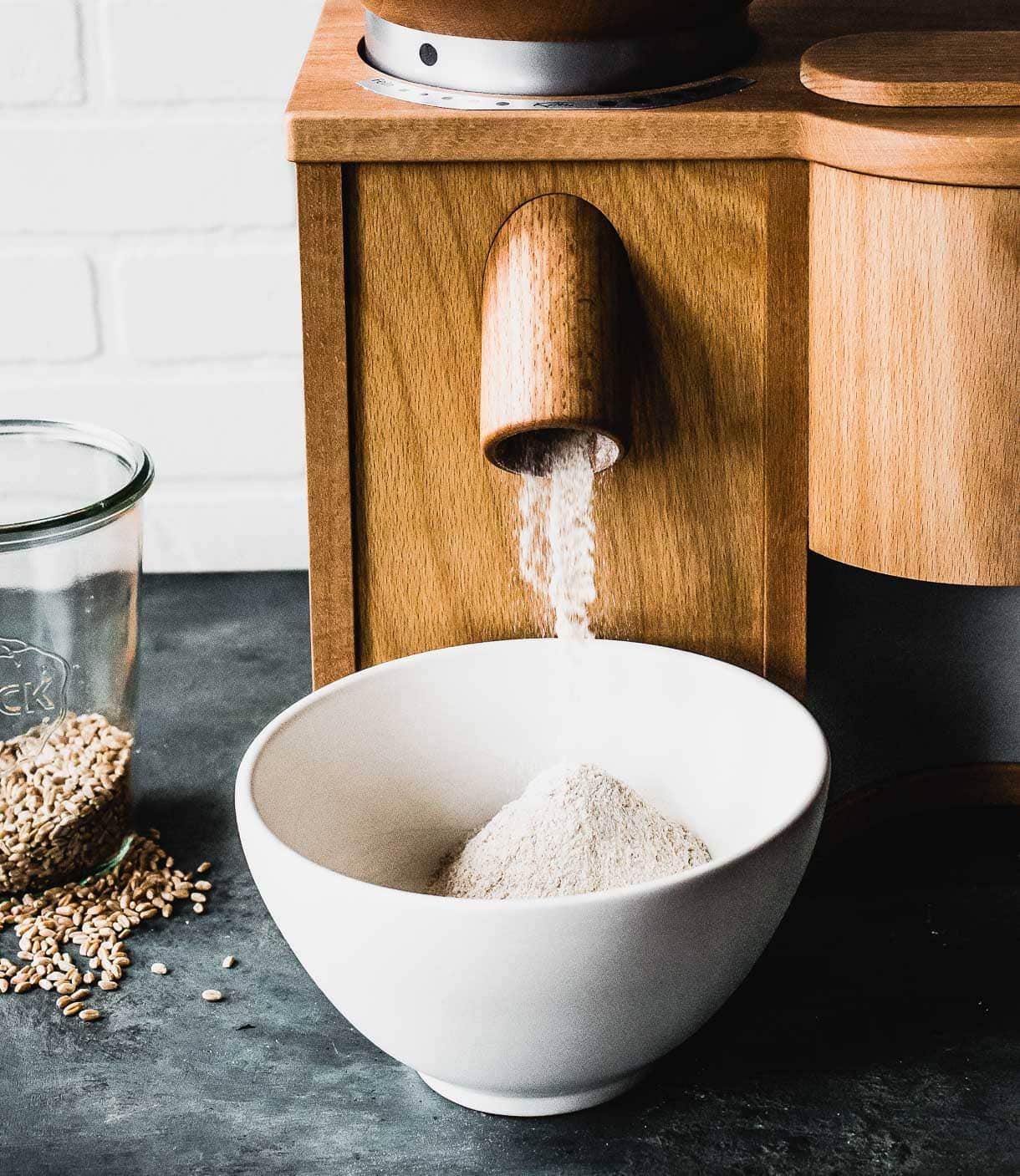
Pleasant Hill Grain has lots of kitchen equipment, and is the exclusive US importer of Austrian made Komo Grain Mills and Flakers (mill is left side of machine, flaker on the right) you see here in the photos. We are working together to start more conversations around home milling, the benefits of using fresh flour, and how easy it is.
They graciously provided me with the Komo Duett Mill, which is gorgeous – constructed of beechwood, and I’ve been using it for the last month, experimenting with different grains, and making bread with the flour using different techniques and ratios.
The process of milling is as simple as:
- Select your grain.
- For sourdough bread, you’ll want to grind it as fine as possible. With the Komo Mill, all you have to do is turn the top hopper as far to the left as it goes before the stone burrs touch each other.
- Flip the switch to turn the mill on.
- Pour grain into the hopper, and boom – FRESH FLOUR!
The grinder side mills hard or soft wheat, rice, kamut, spelt, buckwheat, barley, rye, millet, teff, quinoa, amaranth, sorghum and dent (field) corn. It will also grind lentils, dry beans (pinto, red, chickpeas, kidney & more), and dried, non-oily spices. It isn’t suitable for herbs, oilseeds like flax or sesame, popcorn, or fibrous materials. The grain flaker side (shown above), is incredible too! Wheat, rye, barley, and most commonly, oats are flaked.
When you press your own oat flakes, you’re getting fresh, raw oats with all the delicate essential oils and life energy of the seed. That’s compared to commercial oat flakes, which are steam cooked and heat dried to preserve. Other grains that are normally dry and hard should be softened by briefly rinsing them under water. Then spread the grains on a cloth or towel to let them dry over night or for at least 3-4 hours.
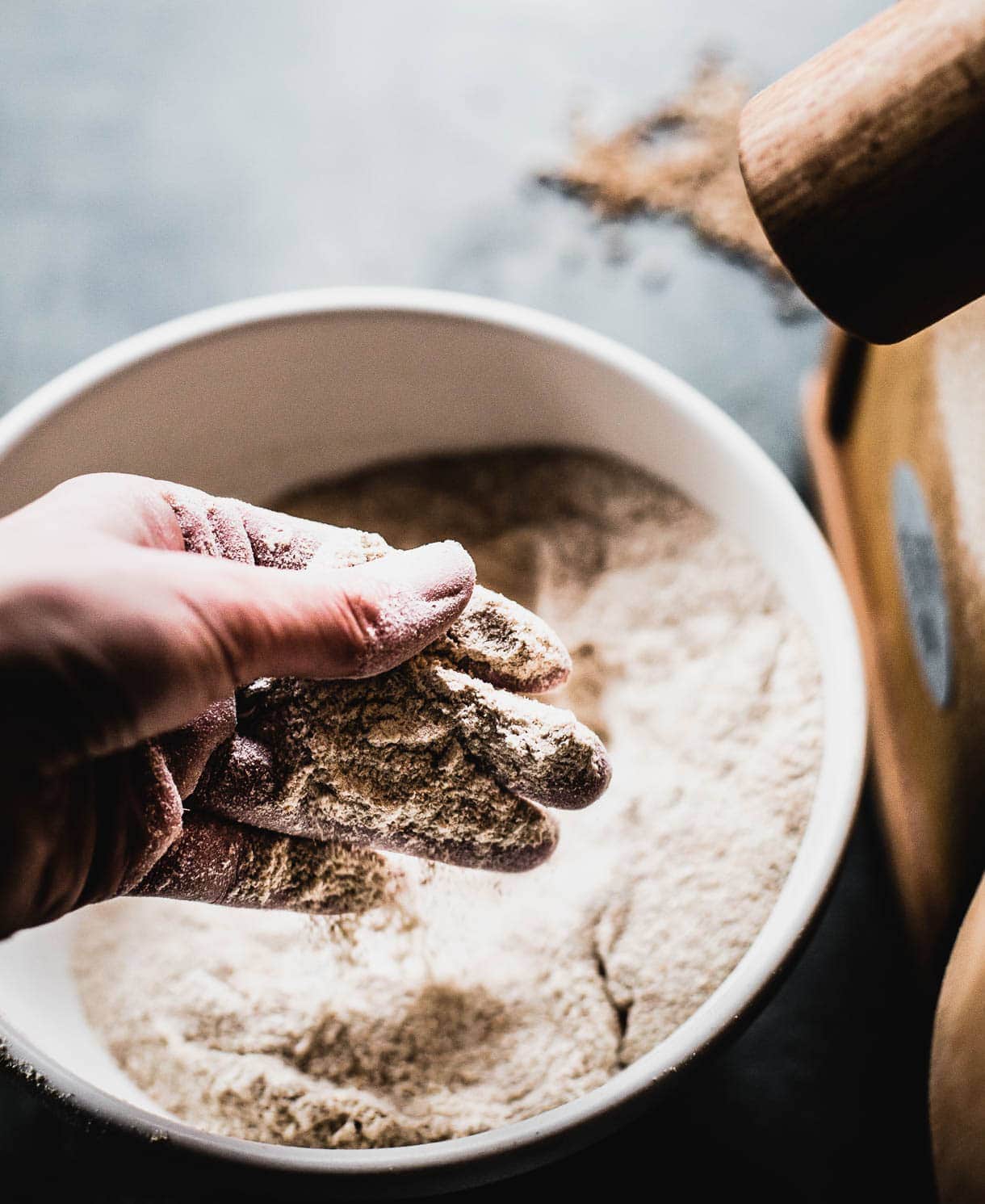
Milling your own flour, without sifting, means you retain 100% of the same wheat berry in your end product. Many mills will label using the term “whole wheat”, but that doesn’t always mean whole grain. Additionally, they will sometimes perform several milling passes, especially on the germ and bran which are sifted out and then later added back in. Once the wheat berry is milled, breaking open that protective bran layer, oxidization begins which causes nutrients to slowly degrade.
So when we mill at home and use the flour immediately, we’re retaining many more nutrients that store bought flour.
But where fresh milled flour really shines is in flavor. The complexity and nuances of each grain comes through, deeply rich and nutty.
I’ve baked with both fresh milled hard red winter wheat, and spelt, and loved each.
The crust becomes crackly and shines! And the crumb is tender, softer than an everyday kind of loaf.
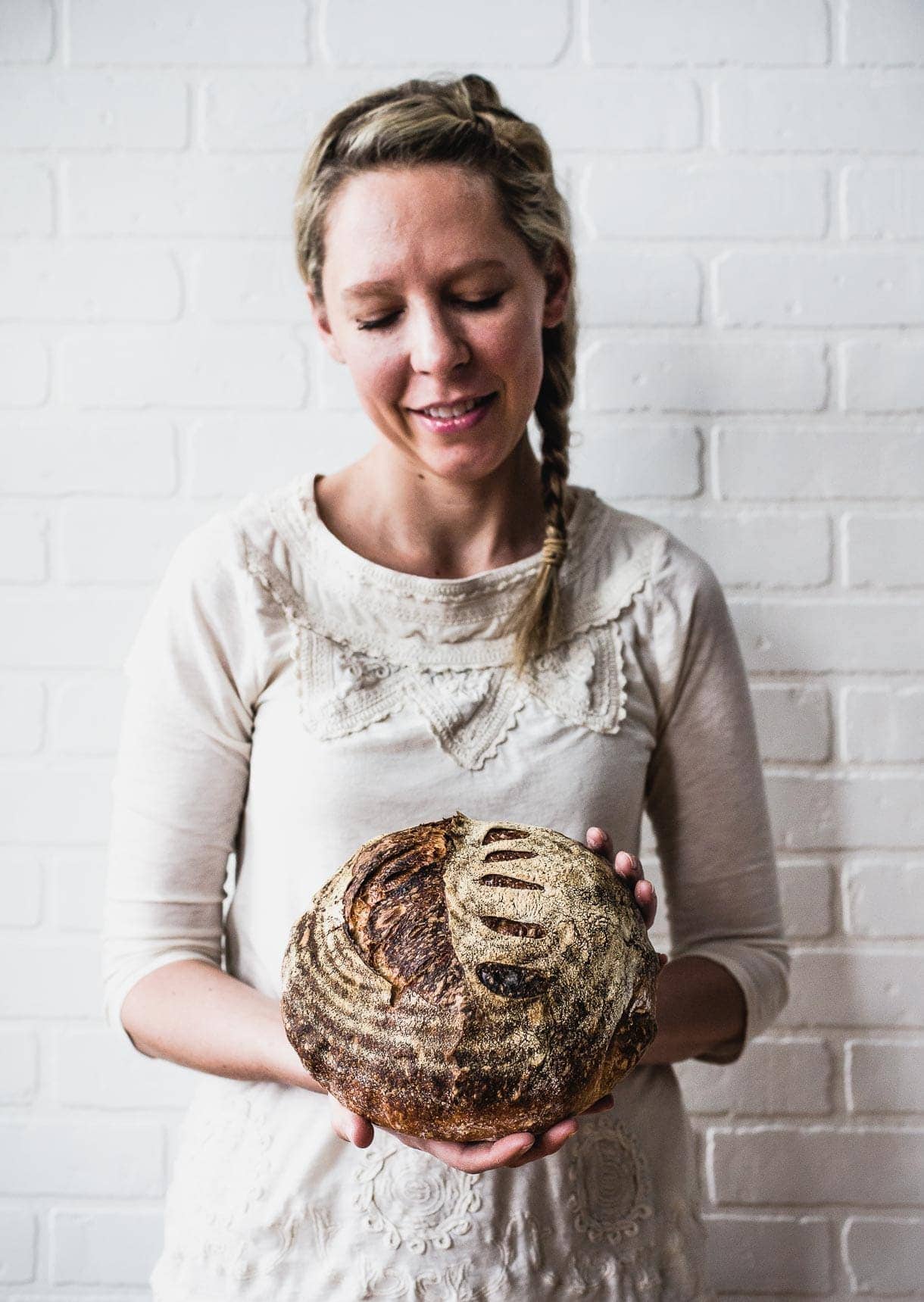
After baking several loaves now with fresh milled flour, the success has been mostly dependent on three things:
- A longer autolyse to let the grains absorb the water better
- Four sets of folds during bulk fermentation
- A cold (refrigerated) proof for the final rise, 8-10 hours
When doing these two things, I achieved the oven spring I was hoping for, and nice holes near the edges of the loaf, with a tighter middle. It’s wonderful for toast and sandwiches.
If you’d like to purchase some of my starter, you can! Right HERE.
My Whole Wheat Sourdough recipe is adapted from the Artisan Sourdough Made Simple cookbook, which has been my guiding star throughout this whole sourdough learning process. I highly recommend it.
More Sourdough Bread Recipes:
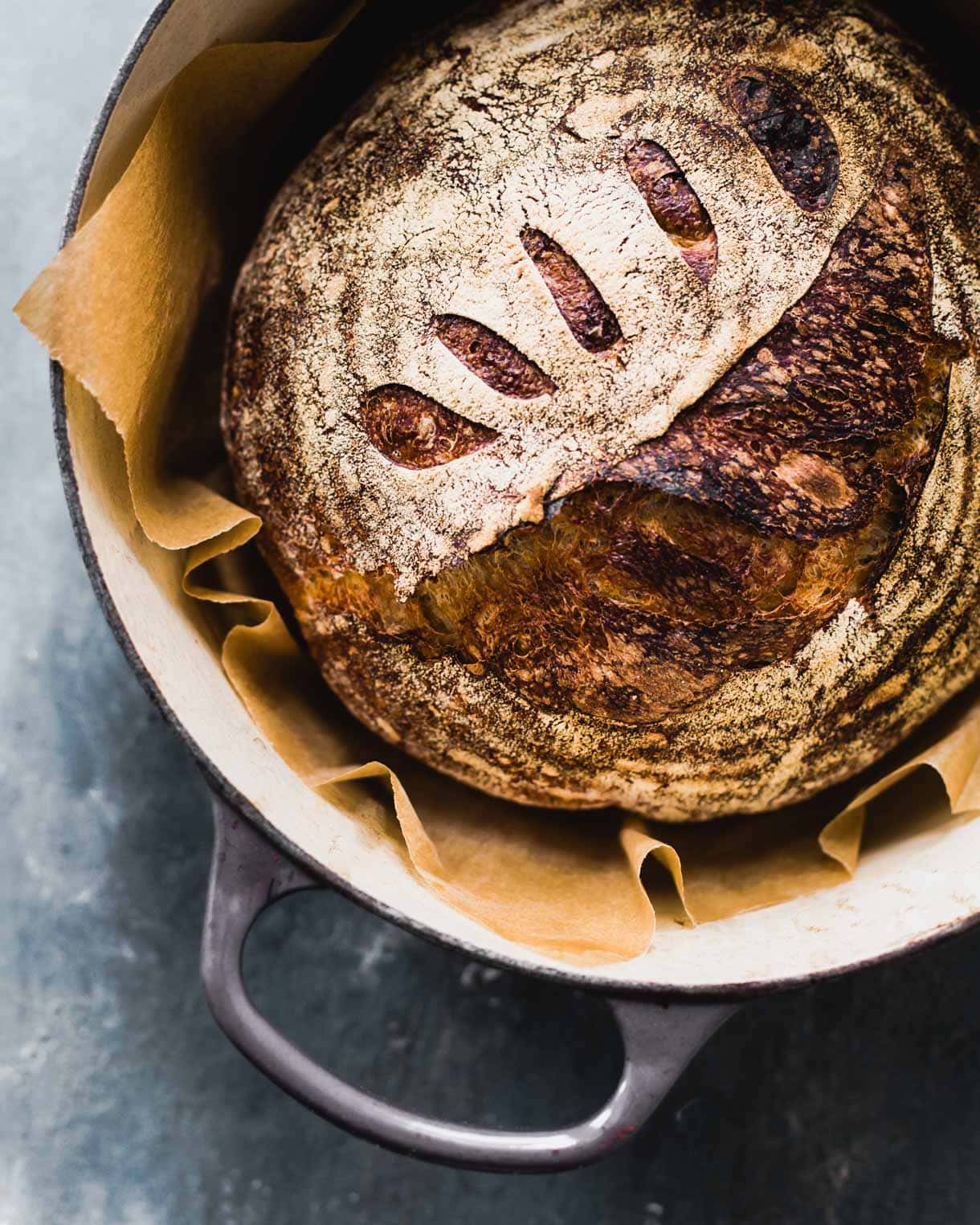
SCALE:
Ingredients
- 55 grams [bubbly active starter] (100% hydration)
- 385 grams warm water (about 85-90 degrees F)
- 15 grams honey
- 150 grams fresh whole wheat flour
- 155 grams all-purpose flour (I use King Arthur)
- 195 grams bread flour (I use King Arthur)
- 9 grams fine sea salt
Instructions
- In a large bowl, whisk starter, water, and honey. Add the flours, mixing first with a fork, then switching to your hands until the dough is shaggy. A rough, sticky dough will form, no dry bits should be showing. Cover with a damp towel and let rest for 1 hour (this is the autolyse).
- After the autolyse, add the salt. Squeeze the salt into the dough, then work the dough generously with your hands for at 2 to 3 minutes, kneading to begin building the gluten. Then finish with your first stretch and folds. Let rest for 30 minutes.
- Perform another set of stretch and folds (video to show you how). Let rest for 30 minutes. Perform another set of stretch and folds, and rest 30 minutes. Perform your 4th and final set of stretch and folds.
- Cover the dough with a damp towel and let rise about around 4-5 more hours if your house is around 70-72 degrees F, until your dough has risen at least 50%, has a bubble or two on top, the top is smooth and a bit glossy, and it jiggles in a bit in the bowl. Go by how the dough looks, rather than time.
- Now it's time to shape. Gently coax the dough onto a flour surface. Shape it into a rustic round and let rest, covered, for 15 minutes. Then shape the dough using this method. Put banneton with dough into a plastic grocery bag, or garbage bag, so that it doesn't dry out, and let cold proof in refrigerator for 8-10 hours.
- Preheat your dutch oven in your oven at 450 degrees F. When oven is preheated, take dough out of refrigerator, cover with a piece of parchment (cut larger than the banneton) and a plate. Then use your hand to hold the plate and flip the plate + banneton over, so that now the banneton is upside down and you can now lift it off so that your dough is on the parchment, ready to score. Gently rub a bit of flour onto the top, and score the dough.
- Lift parchment with bread into dutch oven, put cover on.
- Slide dutch oven onto the middle rack, and bake with cover on for 25 minutes. Remove cover, turn heat down to 430 degrees F, and bake for another 20 minutes, until exterior is golden brown and crispy. Remove from oven, and carefully remove from bread from dutch oven.
- Let cool for one hour before cutting. Store bread in a plastic bag, cut side down for up to four days.
Did you make this?
tag @heartbeetkitchen on instagram and hashtag it #heartbeetkitchen

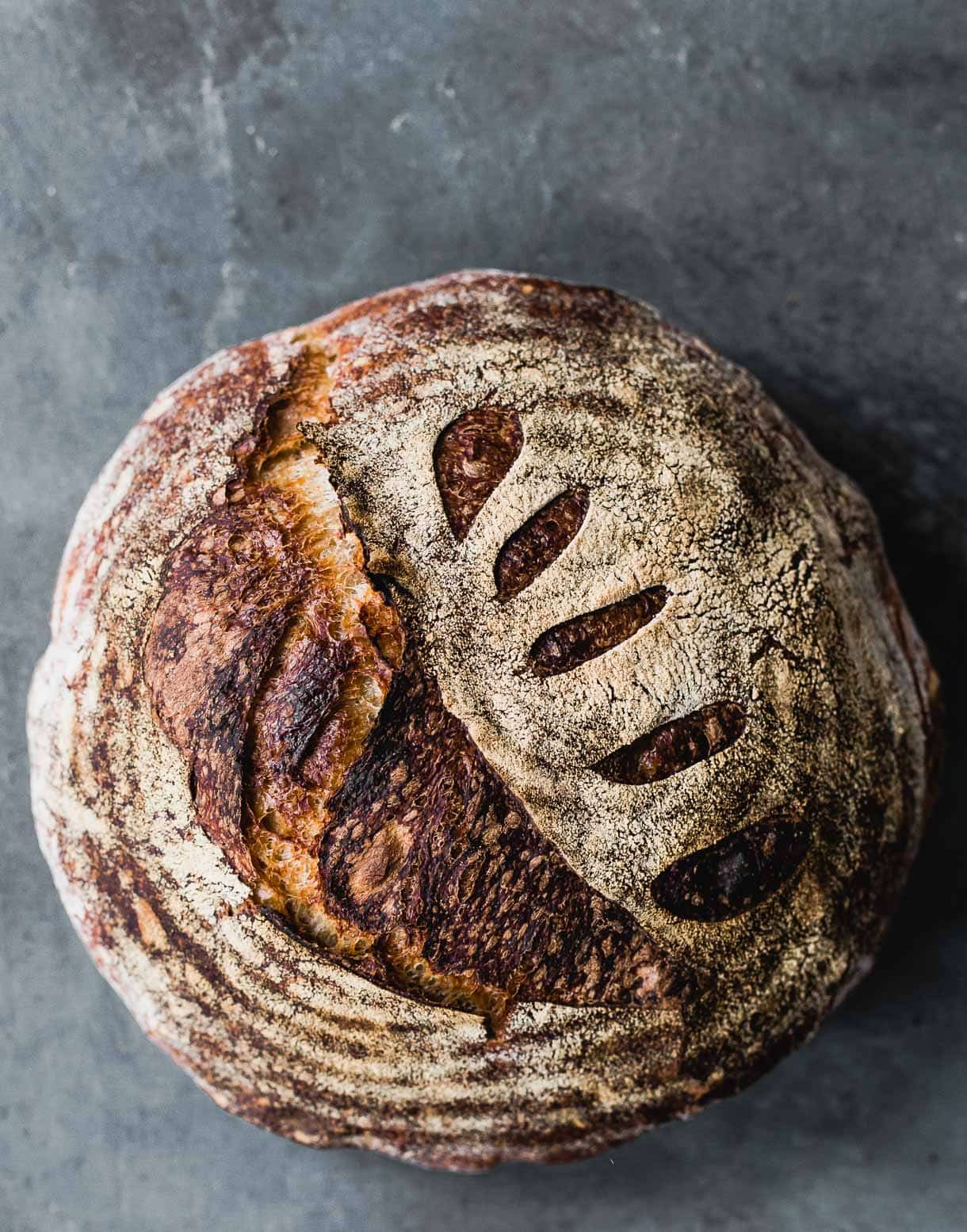
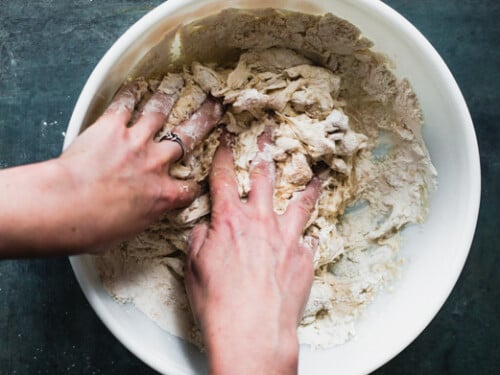
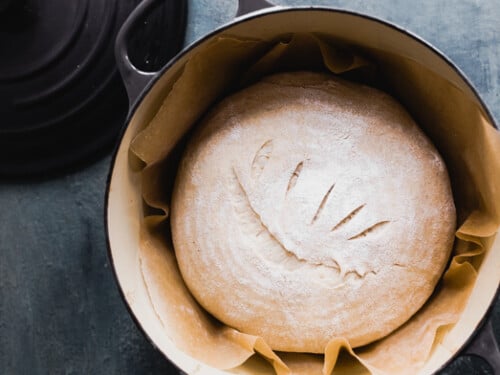
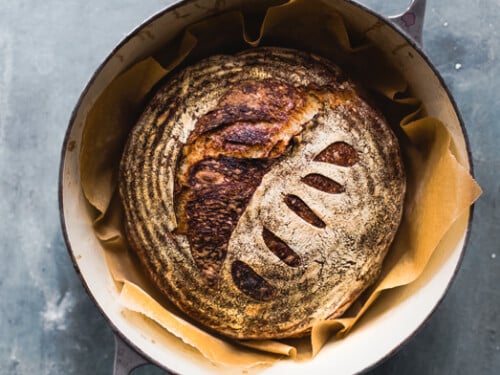

Allison
April 7, 2024
Ratios worked out like a charm for me! I’ve made this recipe twice, and it produces a fluffy, flavorful loaf. I’m lucky enough to have a Brod & Taylor proofer, which I set at 75 degrees. Perfection! Thanks for the great recipe. It’s difficult to find one that is accessible to the quasi bread newbie.
Amanda Paa
April 7, 2024
So glad to hear that, Allison! And that proofer is on my wish list. :)
Jim
April 6, 2024
Amanda, just made this bread with Yecora Rojo as the whole wheat flour. It was very, very good. Nice rise, great crust and crumb. Very soft and moist with a subtle sweet flavor. I think much better flavor than with regular whole wheat flour. Great bread, thanks for the recipe along with you other sourdough breads!
Amanda Paa
April 7, 2024
I need to try and find some of that flour! So glad you enjoyed making this recipe with it.
Julie
March 25, 2024
Any idea what the hydration on this loaf is or what it needs to be with whole wheat? I’m in Florida and anything over 60% comes out flat as a pancake!
Jim
March 17, 2024
Amanda, I have made this bread a few times and it has always come out great. Could other varieties of hard red winter wheat be used such as Yecora Rojo as the whole wheat flour?
Amanda Paa
March 18, 2024
Hi Jim! It will work great with Yecora Rojo Wheat. That is nice and strong. If the dough feels too dry after your first set of stretch and folds, add 10 more grams of water.
Danielle
March 3, 2024
Hey! I absolutely love your whole wheat sourdough sandwich bread recipe! I love that I don’t have to knead by hand but can just use my mixer! It’s super simple. Do you have a recipe like it but that is more traditional sourdough loaf (not sandwich bread) that still has a good amount of protein & fiber? (Which may mean it uses wheat flour to achieve the fiber part?) I make your sandwich bread weekly now and my family LOVES IT! would love a more traditional Dutch oven recipe that uses the mixer too and some kind of fibrous flour (whole wheat ?)!!
Amanda Paa
March 4, 2024
Hi Danielle! I don’t use the stand mixer with regular dutch oven loaves because it is a different technique than enriched dough, like sandwich bread, which has milk and butter added.
Mackenzie Halupa
February 23, 2024
Some of the best loaves I’ve made in my sourdough journey. They rose beautifully and taste great. The nicest ear I’ve ever gotten!
Amanda Paa
February 23, 2024
so glad to hear, Mackenzie! thanks for making the recipe!
Jamie Zimmerman
February 12, 2024
Hi Amanda, Thanks for all you do (especially the fostering of fur babies)!
Could I put this recipe in a regular bread loaf pan to make sandwich slices? If so, would I bake same temperature, etc.?
Amanda Paa
February 12, 2024
Hi Jamie! Here’s a recipe for my Whole Wheat Sourdough Sandwich Bread that is baked in a loaf pan. It’s easy to make!
kinsee
January 31, 2024
would it work if I made it 100% whole wheat and substitute whole wheat flour for all purpose?
Amanda Paa
February 1, 2024
Hi Kinsee! I haven’t tested it that way, so the hydration would not be proper for those swaps.
rebecca lynn berschauer
January 13, 2024
Hi Amanda, I made this recipe and it was fantastic. The crust was the crunchiest I have ever made and the crumb was pretty good . My only issue is I didn’t get a rise after I took it out of the frig. this morning. it flattened out in the frig. When it proofed, it rose at least 50%, maybe more. Instead of all-purpose flour, I used bread flour. Would this be the reason it didn’t rise after baking? Thank you for your time.
Amanda Paa
January 13, 2024
Hi Rebecca! Rise can be affected by a few things; a result of not enough strength built in the dough, a weak starter, or proofing error. Can you describe to me how you did your bulk ferment and your final proof? When you say it flattened in the fridge, what did you have it in?
Taylor
December 29, 2023
Why do you add AP flour? Can I just use wheat and bread flour?
Amanda Paa
December 30, 2023
hi taylor! the ap flour gives some lightness to the crumb that i prefer. if you only want to use ww and bread flour, you can; it will just be a slightly chewier crumb.
Sarah Jane Efird
December 6, 2023
Need it in cups not grams?
Katie
December 6, 2023
Can I leave out the honey as vegan?
Amanda Paa
December 6, 2023
Hi Katie! Replace the honey with maple syrup to keep it vegan and have the same results.
D
December 5, 2023
Hi Amanda, it is not necessary to preheat your oven and DO for 1 hour? Just preheat long enough for oven to reach 450F?
Carol
December 2, 2023
Could I use wheat bran for part of the wheat flour?
Amanda Paa
December 3, 2023
I have not tested this with wheat bran, sorry!
Carol
December 10, 2023
I replaced 1/2 cup wheat flour with wheat bran. Best sourdough I’ve made so far!
Amanda Paa
December 10, 2023
oh awesome, thank you for the update!
Gina
November 21, 2023
I have tried to make other bread in the past, and completely failed! Being skeptical, I followed this recipe to a T. The videos linked within helped tremendously. So happy to say my first loaf turned out amazing!! Will ONLY use this recipe from now on.
Amanda Paa
November 22, 2023
Your photo of it on Instagram was beautiful, lovely bake! So glad you had success.
Gabriella
November 16, 2023
Hi! During the second rise, should the dough double in size? I notice for the first rise you say it should only increase by 50%.
Amanda Paa
November 16, 2023
Hi! On the second rise it should rise another 20 or so %. The majority of the rise happens during the bulk fermentation.
Gabriella
November 17, 2023
Thanks for the tip! My dough has just risen in the fridge for about 10 hours (I made 2 loaves with this recipe) and neither loaf has increased in size at all. Up to this point my dough was looking pretty good. Any idea what went wrong? Fridge proofing never seems to work for me. Maybe my fridge is too cold?
Amanda Paa
November 17, 2023
Hi! That’s normal if this is the 2nd rise. It won’t rise a lot, especially if your dough temperature is cooler than 70 degrees F when it goes into the fridge. Most of the proofing happens during the bulk fermentation.
Laura
November 3, 2023
This recipe is a keeper. I use King Arthur’s 100% Stone Ground Whole Wheat and have mixed the rest of the flours up depending on what I have on hand (bread flour, all-purpose, white whole wheat, etc). I also swap the honey for maple syrup, b/c I’m vegan. It has always turned out great. The timing is always the thing that gets me. 4-5 hours after all the stretch and folds – plus the 8 hours overnight is awkward while working all the time. Still, it’s worth making the effort. I love this bread so much. Very much appreciate the recipe.
Amanda Paa
November 4, 2023
I’m so glad you like the recipe, Laura! Thanks for making it, enjoy the rest of your sourdough bakes!
StevenHB
July 17, 2023
July 17, 2023: Baked one of these this morning and just shared a small piece with my wife. We agreed that it’s great! I’ll post a picture on Instagram and tag it accordingly.
I made a 100% whole wheat loaf recommended by a friend, but I didn’t let it rise long enough. In any case, it was bitter. I’m not sure that 100% WW is ever going to be very good.
This is my first time here: Amanda, it seems odd that comments are undated. Is this something that you control or is comment dating just not a feature of the platform?
Amanda Paa
July 19, 2023
I’m so glad you enjoyed the recipe, Steven! Thanks for making it.
Emily
June 14, 2023
Can’t wait to try this out! Can I cold proof the dough for longer than 10 hours? I may not be able to bake my loaf until 15-16 hours after putting it in the fridge.
Amanda Paa
June 14, 2023
Hello! Yes, you can proof for longer than 10 hours, just be sure that you catch the dough in bulk fermentation at about a 50 to 60%% rise, or it will likely overproof in the fridge.
Jessica Mudry
May 10, 2023
I love this recipe but I can’t do the cold retard today – can I bake after the 5 hours at room temp?
Amanda Paa
May 10, 2023
Hello Jessica! You can bulk ferment on the counter, shape and put into banneton and leave on counter. It should then take about 1 1/2 hours approximately, to go through its final rise. You can use this test to see if it is ready for baking with a counter final rise.
Jessica Mudry
May 10, 2023
Do you mean 11.5 hours from the initial start time? Or from the time it goes into the banneton?
Amanda Paa
May 10, 2023
Final rise on the counter would be approximately 1 1/2 hours (90 minutes) from when it goes into banneton. It will all depend on the temperature of your kitchen and the temperature of the dough.
Jessica Mudry
May 10, 2023
:). I read 11.5 – LOL. This is perfect – thanks.
Amanda
April 27, 2023
Just pulled mine outta the oven!! Looks so good!! Can’t wait for it to cool so I can check the crumb! Thank you!!
Amanda Paa
April 27, 2023
Yay! If you’re on Instagram share a photo with me, would love to see!
Chris
April 26, 2023
Hey I just have a quick question, are you baking this in a really dry climate? That seems like a lot of water.
Amanda Paa
April 27, 2023
Hello! This is a normal climate. The amount of water is needed for whole wheat breads because it soaks up more liquid than bread or all purpose flour because it has the bran and germ in tact.
April
April 2, 2023
Thank you so much for this recipe I love it! I’m a beginner but wanted to use a whole wheat recipe to feed my family! This comes out perfectly every time!
Amanda Paa
April 2, 2023
Yay, I’m so glad your family enjoyed the bread! And can’t wait to hear what sourdough recipe you make next.
Trisha
February 22, 2023
Love this recipe!
Morgan
December 21, 2022
Does this only make one loaf? Usually when I use ~500h flour it makes two loaves. I also only have oval bannetons, would that necessitate any changes to make the dough fit?
Amanda Paa
December 21, 2022
Hello! I use this size oval banneton to make this whole wheat sourdough and it fits perfectly.
Linnae
October 12, 2022
So I’ve noticed that some of your sourdough recipes give the option of either a shorter final rise on the counter or a longer rise in the refrigerator after shaping. This one specifically calls for a cold proof in the refrigerator. Is there something specific about the whole wheat loaf where that is recommended, or could you do a shorter final rise on the counter?
Amanda Paa
October 12, 2022
You could do counter for shorter time or fridge, I just prefer longer in fridge because it adds flavor and is easier to score!
bonnie
September 21, 2022
This is my everyday sourdough recipe, i have been using it for almost a year, we love it so much! Thank you!
Amanda Paa
September 21, 2022
So glad to hear that it’s loved in your home!
Beth
September 12, 2022
I have made this loaf of bread twice. It turns out perfectly every time! These recipes are concise and easy to follow. Thanks Amanda for the incredible recipes you continue to create for those of us who follow you!
Marlene
August 7, 2022
This came out well, except that my dough was very sticky and I had to keep adding flour. It was hard to work with (stuck to my fingers a lot) until the second or third stretch and fold. I weighed all ingredients precisely. Perhaps it was because I used purchased whole wheat flour, not fresh-milled, and also because it was more humid than usual in So Cal this weekend. (I usually make an oval seeded whole wheat loaf and bake on a stone, as I don’t have an oval baker. I did use the Dutch oven for this one.)
Cheri
August 2, 2022
Thank you for this lovely starter! When I checked on it on day 3…bubbles galore! I’ve been feeding it einkorn whole wheat flour. 30 g water and 48 g einkorn flour. Can’t wait to bake with it!
Amanda Paa
August 2, 2022
Fabulous, so glad to hear! Enjoy your sourdough journey!
Mimi
June 20, 2022
Hi! I’ve baked using your Everyday Sourdough recipe and first time trying this one. Thank you for your recipes! My loaves never turn out as brown as yours do in the photos, even if I leave them in for a little longer. What could be the reason?
Amanda Paa
June 20, 2022
Hi Mimi! If your loaves are not browning, there are typically 2 culprits. First, your oven temperature might be off, so it’s important to use and oven thermometer to make sure it’s actually heating to what is reads. If the temperature is too low, the Maillard reaction that causes browning will not occur. More than likely though, something is off in the proofing. When bread is over-proofed, the yeast uses up all the sugars in the flour and then there is no sugar to caramelize and brown. Hope that helps.
Col
June 2, 2022
I was so impressed with this recipe the first time I tried it, it is now my go to!.
I would like some advice to correct a small problem I have which detracts from the finished product.
I use the recommended ingredients, including freshly milled flour in my Whisper Mill. My starter is freshly milled wholewheat flour 13% protein, the bread flour is over 14% protein
The baking schedule is feed starter 8:00am, mix etc at 1:00pm, into Banneton 5 :00pm. Into frige 10:00pm, bake at 8:00am. The problem I encounter each time is that the dough is a little too slack, hard to shape and slumps slightly, even after 10 hours in the frige.
I assume I have to fine tune my stretch and fold/ rest period and or my Bulk fermentation time, have tried a couple of times with no success, can you provide me with any suggestions? It would be much appreciated.
Every day is a good day; some are better than others
Col
June 3, 2022
Correction, into Banneton at 5:00 should read Bulk Ferment at 5:00
Amanda Paa
June 3, 2022
Hello! If your dough is a bit too slack and hard to shape, you could be overproofing. Or not building enough strength during your stretch and folds. Can you email me a photo of the crumb? That will help me advise you on the proofing or strength.
Samantha
April 17, 2022
I love your everyday sourdough recipe. As a beginner, EVERYONE who’s had my bread thinks I should open a bakery with that recipe 😆 So I though I’d try a second recipe which is this one. My husband asked if I can make my bread taller…so my question for you is what affects the height of of the bread? Could it be my oven?
Col
April 11, 2022
Whole Wheat Sourdough Bread Recipe, I am interested in the reason for having a combination both AP flour and bread flour.
Thanks
Amanda Paa
April 11, 2022
Hello! The bread flour helps give structure, and the all-purpose flour helps lighten the loaf so that even though it is whole wheat based, it isn’t dense.
Georgina S
March 25, 2022
I baked this today and it is absolutely delicious! Definitely recommend giving it a go. Thanks Amanda for another fabulous recipe.
Amanda Paa
March 26, 2022
Terrific, so glad you liked the whole wheat recipe!
Caitlin
March 7, 2022
Hi there! If I want to make a few of these doughs and freeze them, do I freeze after the entire bulk fermentation is done (right before baking) or do I let it rise just once and then freeze?
Amanda Paa
March 7, 2022
Hi Caitlin! I have only frozen baked loaves, not any that are raw dough in process.
Cole Herman
April 20, 2022
When I let it rest between the stretch and folds do I cover with the damp towel again or just leave it open to the air?
Amanda Paa
April 20, 2022
Covered with a damp towel during all of the rests so it doesn’t dry out.
Gabbie E
February 10, 2022
This is the most approachable whole wheat sourdough recipe I could find! I typically make the everyday sourdough loaf, but wanted to mix it up and I’m so glad I did! The oval shaping method worked well and I was able to get a great ear. Thank you for all of the photos and helpful tips
Amanda Paa
February 11, 2022
I’m so glad it turned out well for you!
Rose
October 27, 2021
Should the pot be preheating in the oven while the oven preheats, or should the pot be put in cold with baking begins?
Amanda Paa
October 27, 2021
Hi Rose! You can actually do either. With this loaf, I actually don’t preheat and have always had great results. But totally up to you!
Edian
September 4, 2021
i am not good at baking bread but then i tried this recipe. let me tell you, it turned out to be great, everybody loved it. Xoxo
mercmakesfood
July 3, 2021
Delightful, delicious, and easy!
Amanda Russcol
December 14, 2020
This recipe is fantastic! I’ve modified it for altitude and to use mostly whole wheat flour, and it’s always so good. Your videos are so wonderful, too! Thank you!
Amanda Paa
December 15, 2020
so great to hear! love the flavor of this whole wheat loaf, too.
Angela
October 12, 2020
Hi Amanda,
What can I substitute for the freshly milled whole wheat flour? Will whole wheat bread flour work? Thanks.
Amanda Paa
October 14, 2020
Yes, whole wheat flour will work!
Margaret
July 6, 2020
I made this today with my relatively new starter and was incredibly pleased with the results. It is the first time my attempted sourdough has actually held its shape and not ended up falling apart when taken out of the banneton. The instructions were easy to follow and didn’t seem like an impossible process compared to other sourdough recipes. I will surely be making this again, thank you!
Amanda Paa
July 6, 2020
Yay! I’m so glad you are enjoying the sourdough journey and had success with this recipe! Thanks for the note. ❤️
Shari
May 8, 2020
Hi,
Could you give measurements for those who don’t have a scale?
I just ordered a mill because of the four shortage and am worried that my sourdough will be too dense with this fresh ground flour.
Amanda Paa
May 8, 2020
Hi Shari! It’s very important to have a scale for making sourdough bread, as that is how the hydration levels and measurements are shared across the world. So 90% of sourdough recipes you find will be listed in grams. This scale is relatively inexpensive and you’ll get so much use out of it.
Leigh Allison Kelley
May 4, 2020
Thanks for the recipe and video! It turned out great! If I wanted it a little less “sour”, could I shorten the time of the rising in between folds? Would that work? Would the gluten not develop as well if I did this? Or would it not have enough rise time? Thanks!
Amanda Paa
May 4, 2020
Hi Leigh! So glad your loaf turned out well! Did you do any of the fermentation in the refrigerator? This will increase sour taste. So if you wanted less of that, do both rises on the counter. The stretch and folds are not part of the sourness.
Another factor is your starter. Use it early on in its peak, so around 4-5 hours after feeding it. This will decrease the tang as wel.
Leigh Allison Kelley
May 5, 2020
I did do the refrigerator part overnight. When I took it out of the fridge the next morning, it took over an hour to warm up. In fact, it was still a little cool when I put it in the oven. Did I leave it out too long? Can I put it in the oven cold? If I were to leave it on the counter and not do the overnight, how long would you suggest to let it sit after the last fold? Thanks for taking the time to reply! It’s really helpful to have someone to answer questions!!!
Amanda Paa
May 5, 2020
Hello! I bake it cold, straight from the refrigerator after the final rise. This makes it much easier to score, and hold its shape better!
I do the bulk ferment on the counter, and the final rise overnight in the refrigerator. The recipe will give time estimates for how long the bulk fermentation lasts (which the clock starts as you begin your first stretch and fold.)
Chelsea
May 2, 2020
Is it okay if it sits in the fridge longer than 10 hours? I’m in the middle of the folding/rising right now and just realized with the timing that it’ll be in there for more like 12-14 hours!
Thanks
Amanda Paa
May 2, 2020
Hi Chelsea!
That should be just fine. Take it out of the fridge as close to 12 hours as possible, and go straight from fridge to scoring to baking. So it will be cold when you score it. (So preheat your oven prior to taking out of fridge.)
Chelsea
May 4, 2020
Thank you for your timely response! I did exactly what you suggested and it turned out great. Thanks for having a sourdough recipe with fresh-milled flour!
Sheri Nix
April 20, 2020
Amanda, in step 4 you say “Then shape the dough using this method, into a tight round. ” What method are you referring too? I’ve watched you’re video in the links provided in the “Sourdough you make every week” recipe. Is that what you’re referring too? Since this is Whole Wheat Sourdough I wasn’t sure if you used a different method. Thanks!!
Amanda Paa
April 20, 2020
Yes, exactly – the shaping method I showed in the video, which I’ve linked in the recipe now now!
Sheri Nix
April 16, 2020
Making this recipe today. Its in it’s autolyse phase! Wish me luck! I’ll let you know how it turns out!
Erin
January 22, 2020
Do you add milled flour into feeding your starter as well or just use all purpose and then add milled flour when making the bread?
Amanda Paa
January 22, 2020
Hi Erin!
I feed my starter with organic all-purpose, and use the fresh milled flour for baking sourdough.
Elizabeth
June 4, 2019
Thank you so much for this article. This is the closest I’ve come to photo-worthy sourdough. The local natural food store sells locally grown wheat berries so this is also the closest I’ve come to a locally produced loaf of bread. Thanks again!
amandapaa
June 4, 2019
wonderful! happy baking!
Cecile
April 8, 2019
I’m going to try the bulk rise and shaping the dough prior to fermentation as you suggest. I’ve been shaping the loaf after the fermentation process. Meanwhile I am wondering if you preheat the Dutch oven? I have been using a pizza stone with steam under it because the Dutch oven kept burning the bottom of the loaf.
amandapaa
April 9, 2019
Hi Cecile!
I do not preheat the dutch oven, as I did some research on that and it does not affect the rise negatively, however like you said, the bottom of the sourdough loaf can burn. Hope you love this recipe! Let me know how it turns out for you.
Raven Valdes
August 6, 2018
Hi there! I’m headed out of town (flying) and I would love to make sourdough while I’m away. Do you recommend bringing starter, making the dough and baking when I reach my destination or just baking the bread at home and bringing it with me? Thanks in advance!
amandapaa
August 6, 2018
Hello! You could really do either. If you plan on eating it a day after fly, it will stay fresh baking whole and carrying on, then slicing when you get to destination and storing in plastic bag. If you plan on it being a few days in between flying and when you’d want to eat the bread, say 3 or so days, you could bring your starter along. However, then you are unfamiliar with the oven you’d be baking it in and the tools available to you. Hope that helps!
Raven Valdes-Kenworthy
July 18, 2018
As a first time bread maker, this recipe was fantastic! I couldn’t be more excited with the turn out. I was so excited to slice into it and to not only learn that it was soft but that it was edible as well (my friends have told me horror stories.) Thank you thank you thank you Amanda for providing such a wonderful guideline.
amandapaa
July 20, 2018
I’m so glad the recipe was successful for you! I know starting sourdough can be a little intimidating so I try to make the directions thorough. Enjoy your time baking! xo
Sarah
June 4, 2018
Hello! I’ve been grinding my own grains ever since I was a kid, but I’ve never tried making sourdough with the freshly ground flour. Have you ever tried making it without the added processed flour? I imagine hard white wheat would be the best wheat for the job. Any thoughts? I never use store bought flour and would prefer not to, but for the occasional magnificent loaf of sourdough, I might be a tad more flexible. 😁
amandapaa
June 4, 2018
Hi Sarah!
So great that you’ve been grinding your own grains for so long. I am so happy to be doing it in my own kitchen. Bread purpose and all purpose that are organic and unbleached aren’t actually “processed”. I use King Arthur both, bread flour and AP, and the Ap is “Milled from 100% organic hard red winter and spring wheats, this jack-of-all-trades flour is malted; unenriched.” The bread flour is Certified 100% Organic Wheat Flour, 100% Organic Malted Barley Flour, so the protein count is higher and gives the best results. However, if you wanted to do a 100% whole wheat sourdough from your own fresh milled grain, I agree that hard white wheat would be the best. Here’s a recipe that looks like it has pretty good results too: http://www.thefreshloaf.com/node/54851/100-whole-wheat-sourdough
Eliza
February 14, 2021
Refined/processed flour is all types of flour that are non whole wheat/whole grain flours. King Arthur unbleached AP and Bread flours, while they are not chemically treated they are stripped of bran and germ leaving you with only the endosperm of the wheat. Which is considered processed or refined.
Thank you for posting this recipe and I am excited to try it out!
McKenzie
May 21, 2018
Just to follow up: This sourdough was PERFECTION. I can’t believe how good it turned out! I’ve made sourdough in the past, but always had a problem getting that buoyancy in the crumb. My husband loved it too, and we ended up making grilled vegetable/chicken salad sandwiches with a green sauce. It tasted gourmet because of the bread! Thank you.
amandapaa
May 21, 2018
omg, yay!! i’m so glad it was successful for you. thanks for letting me know!
McKenzie
May 18, 2018
I have my sourdough starter on the counter and ready for baking this tomorrow! It looks amazing. I’ve never made a sourdough with whole wheat, so I’m really hoping it isn’t too dense. *Fingers crossed*
amandapaa
May 19, 2018
awesome! i hope it goes well for you. i find that whole wheat doesn’t quite get the same oven spring, but the crumb is so wonderfully soft and flavorful.
Natalie Ellis
May 15, 2018
I truly fell in love this the mill at the first glance. It’s so beautiful and useful as you have showed!
I’ve never thought of milling the flour be myself but if I do one day, this is absolutely the first option coming out in my mind!
amandapaa
May 16, 2018
It’s so dreamy! Unlike so many other appliances, it’s as beautiful as it is functional. Hope someday one graces your home!
Cassie Thuvan Tran
May 13, 2018
This looks like SUCH an incredible kitchen appliance for an even more incredible recipe! Lately I have been loving making my own baguette bread but I really want to aim to create an amazing whole wheat sourdough bread. This is going to be such an amazing new project to tackle! I just have to figure out how to make a good starter or buy one!